Digital Marketing Opportunities & Challenges: Marriott Hotels Report
VerifiedAdded on 2023/01/11
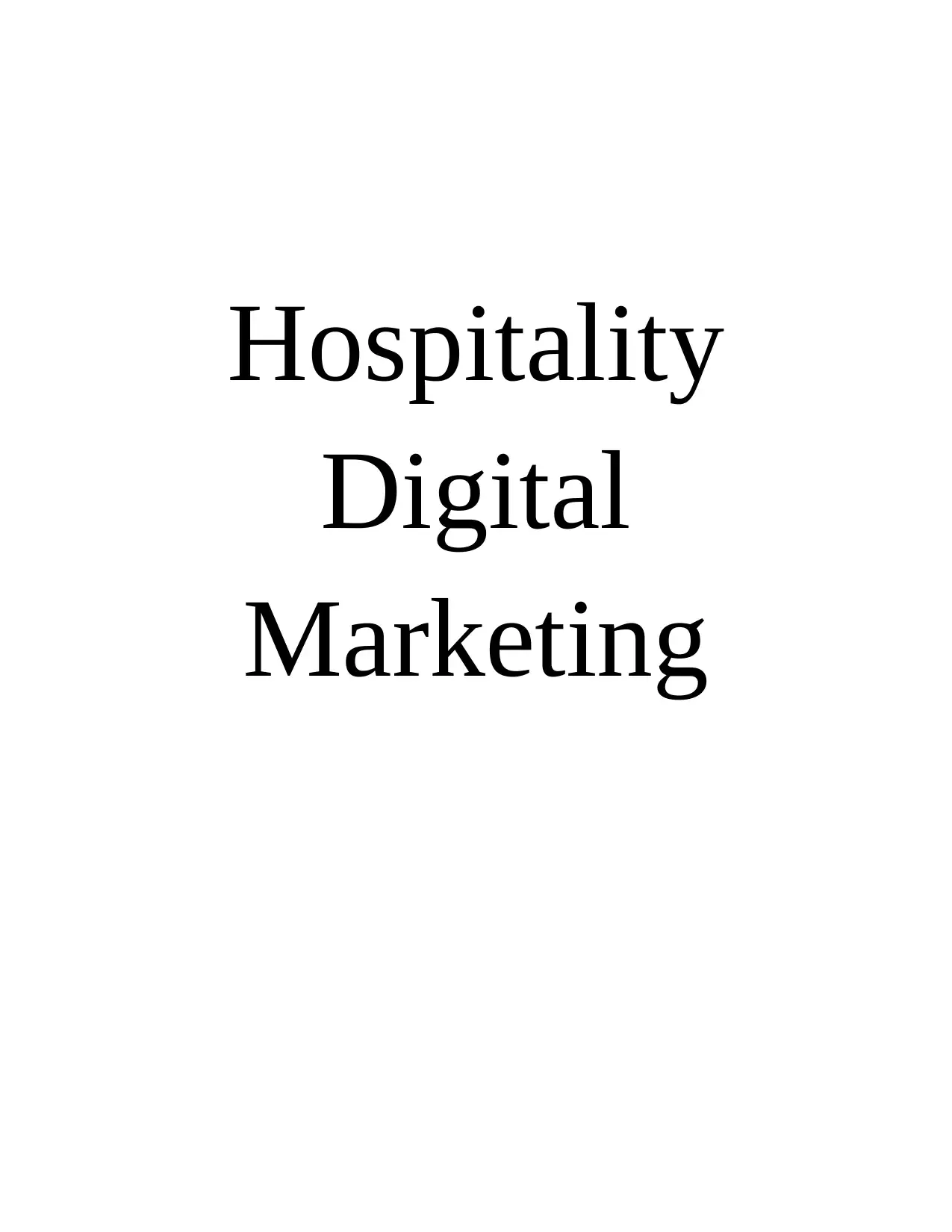
Digital
Marketing
Paraphrase This Document
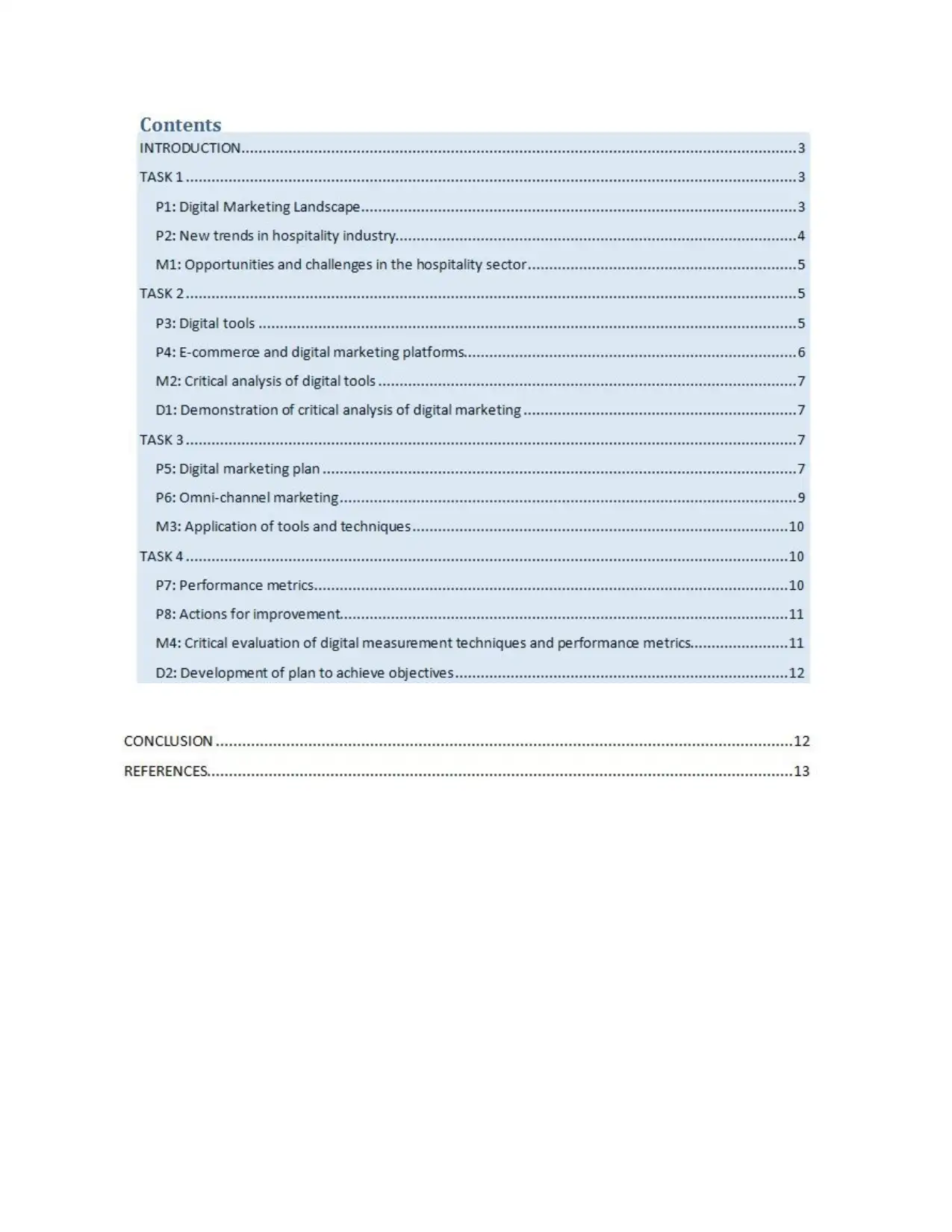
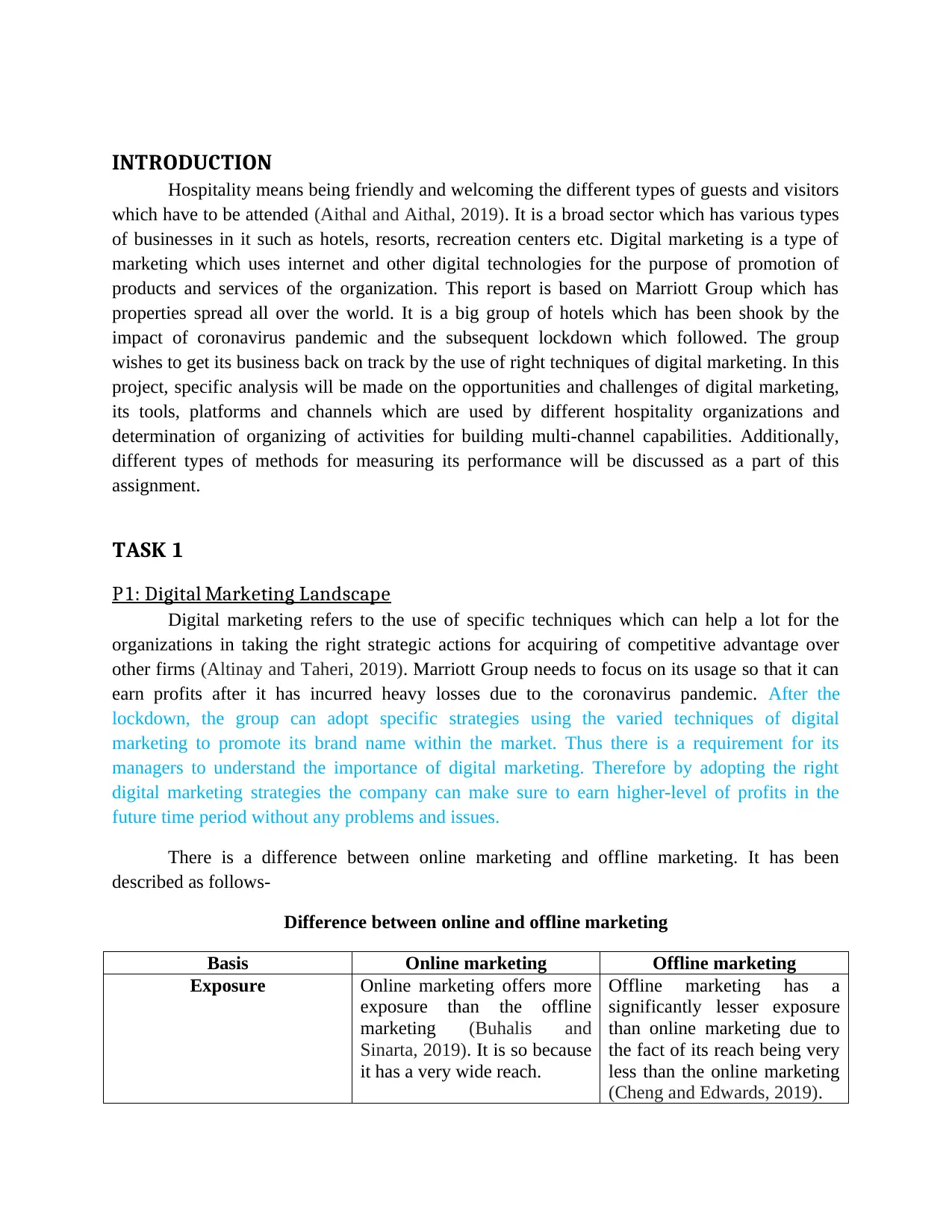
Hospitality means being friendly and welcoming the different types of guests and visitors
which have to be attended (Aithal and Aithal, 2019). It is a broad sector which has various types
of businesses in it such as hotels, resorts, recreation centers etc. Digital marketing is a type of
marketing which uses internet and other digital technologies for the purpose of promotion of
products and services of the organization. This report is based on Marriott Group which has
properties spread all over the world. It is a big group of hotels which has been shook by the
impact of coronavirus pandemic and the subsequent lockdown which followed. The group
wishes to get its business back on track by the use of right techniques of digital marketing. In this
project, specific analysis will be made on the opportunities and challenges of digital marketing,
its tools, platforms and channels which are used by different hospitality organizations and
determination of organizing of activities for building multi-channel capabilities. Additionally,
different types of methods for measuring its performance will be discussed as a part of this
assignment.
TASK 1
P1: Digital Marketing Landscape
Digital marketing refers to the use of specific techniques which can help a lot for the
organizations in taking the right strategic actions for acquiring of competitive advantage over
other firms (Altinay and Taheri, 2019). Marriott Group needs to focus on its usage so that it can
earn profits after it has incurred heavy losses due to the coronavirus pandemic. After the
lockdown, the group can adopt specific strategies using the varied techniques of digital
marketing to promote its brand name within the market. Thus there is a requirement for its
managers to understand the importance of digital marketing. Therefore by adopting the right
digital marketing strategies the company can make sure to earn higher-level of profits in the
future time period without any problems and issues.
There is a difference between online marketing and offline marketing. It has been
described as follows-
Difference between online and offline marketing
Basis Online marketing Offline marketing
Exposure Online marketing offers more
exposure than the offline
marketing (Buhalis and
Sinarta, 2019). It is so because
it has a very wide reach.
Offline marketing has a
significantly lesser exposure
than online marketing due to
the fact of its reach being very
less than the online marketing
(Cheng and Edwards, 2019).
⊘ This is a preview!⊘
Do you want full access?
Subscribe today to unlock all pages.

Trusted by 1+ million students worldwide
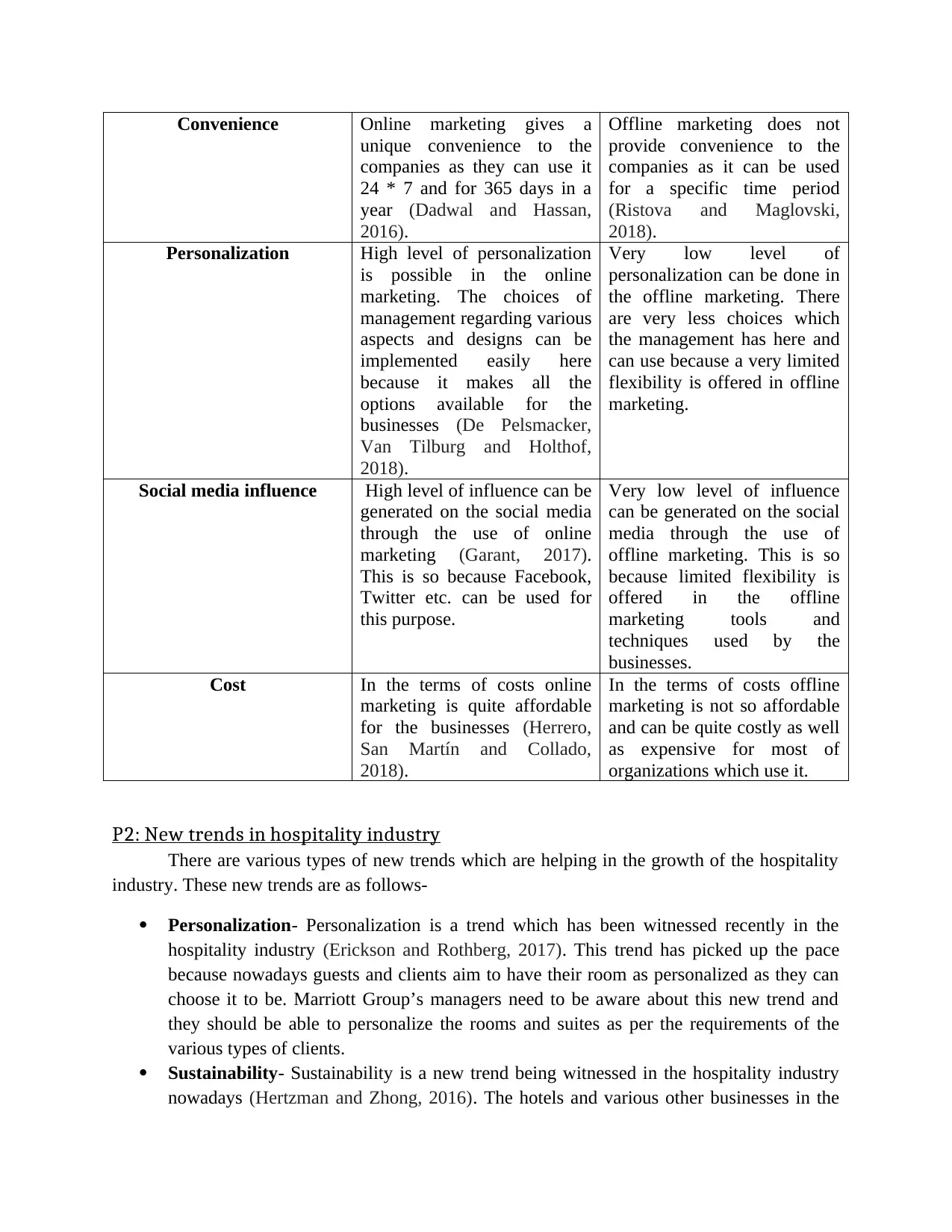
unique convenience to the
companies as they can use it
24 * 7 and for 365 days in a
year (Dadwal and Hassan,
2016).
Offline marketing does not
provide convenience to the
companies as it can be used
for a specific time period
(Ristova and Maglovski,
2018).
Personalization High level of personalization
is possible in the online
marketing. The choices of
management regarding various
aspects and designs can be
implemented easily here
because it makes all the
options available for the
businesses (De Pelsmacker,
Van Tilburg and Holthof,
2018).
Very low level of
personalization can be done in
the offline marketing. There
are very less choices which
the management has here and
can use because a very limited
flexibility is offered in offline
marketing.
Social media influence High level of influence can be
generated on the social media
through the use of online
marketing (Garant, 2017).
This is so because Facebook,
Twitter etc. can be used for
this purpose.
Very low level of influence
can be generated on the social
media through the use of
offline marketing. This is so
because limited flexibility is
offered in the offline
marketing tools and
techniques used by the
businesses.
Cost In the terms of costs online
marketing is quite affordable
for the businesses (Herrero,
San Martín and Collado,
2018).
In the terms of costs offline
marketing is not so affordable
and can be quite costly as well
as expensive for most of
organizations which use it.
P2: New trends in hospitality industry
There are various types of new trends which are helping in the growth of the hospitality
industry. These new trends are as follows-
Personalization- Personalization is a trend which has been witnessed recently in the
hospitality industry (Erickson and Rothberg, 2017). This trend has picked up the pace
because nowadays guests and clients aim to have their room as personalized as they can
choose it to be. Marriott Group’s managers need to be aware about this new trend and
they should be able to personalize the rooms and suites as per the requirements of the
various types of clients.
Sustainability- Sustainability is a new trend being witnessed in the hospitality industry
nowadays (Hertzman and Zhong, 2016). The hotels and various other businesses in the
Paraphrase This Document
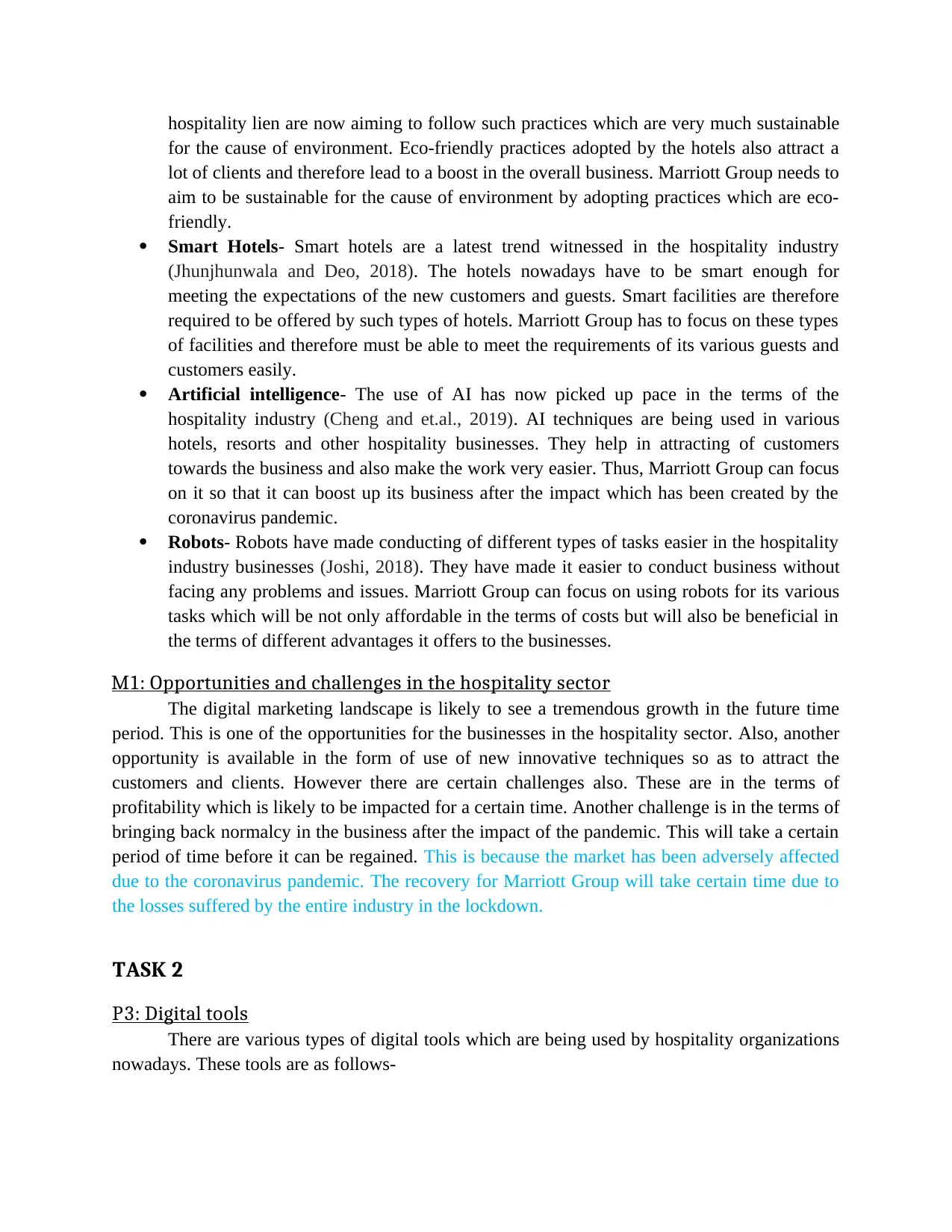
for the cause of environment. Eco-friendly practices adopted by the hotels also attract a
lot of clients and therefore lead to a boost in the overall business. Marriott Group needs to
aim to be sustainable for the cause of environment by adopting practices which are eco-
friendly.
Smart Hotels- Smart hotels are a latest trend witnessed in the hospitality industry
(Jhunjhunwala and Deo, 2018). The hotels nowadays have to be smart enough for
meeting the expectations of the new customers and guests. Smart facilities are therefore
required to be offered by such types of hotels. Marriott Group has to focus on these types
of facilities and therefore must be able to meet the requirements of its various guests and
customers easily.
Artificial intelligence- The use of AI has now picked up pace in the terms of the
hospitality industry (Cheng and et.al., 2019). AI techniques are being used in various
hotels, resorts and other hospitality businesses. They help in attracting of customers
towards the business and also make the work very easier. Thus, Marriott Group can focus
on it so that it can boost up its business after the impact which has been created by the
coronavirus pandemic.
Robots- Robots have made conducting of different types of tasks easier in the hospitality
industry businesses (Joshi, 2018). They have made it easier to conduct business without
facing any problems and issues. Marriott Group can focus on using robots for its various
tasks which will be not only affordable in the terms of costs but will also be beneficial in
the terms of different advantages it offers to the businesses.
M1: Opportunities and challenges in the hospitality sector
The digital marketing landscape is likely to see a tremendous growth in the future time
period. This is one of the opportunities for the businesses in the hospitality sector. Also, another
opportunity is available in the form of use of new innovative techniques so as to attract the
customers and clients. However there are certain challenges also. These are in the terms of
profitability which is likely to be impacted for a certain time. Another challenge is in the terms of
bringing back normalcy in the business after the impact of the pandemic. This will take a certain
period of time before it can be regained. This is because the market has been adversely affected
due to the coronavirus pandemic. The recovery for Marriott Group will take certain time due to
the losses suffered by the entire industry in the lockdown.
TASK 2
P3: Digital tools
There are various types of digital tools which are being used by hospitality organizations
nowadays. These tools are as follows-
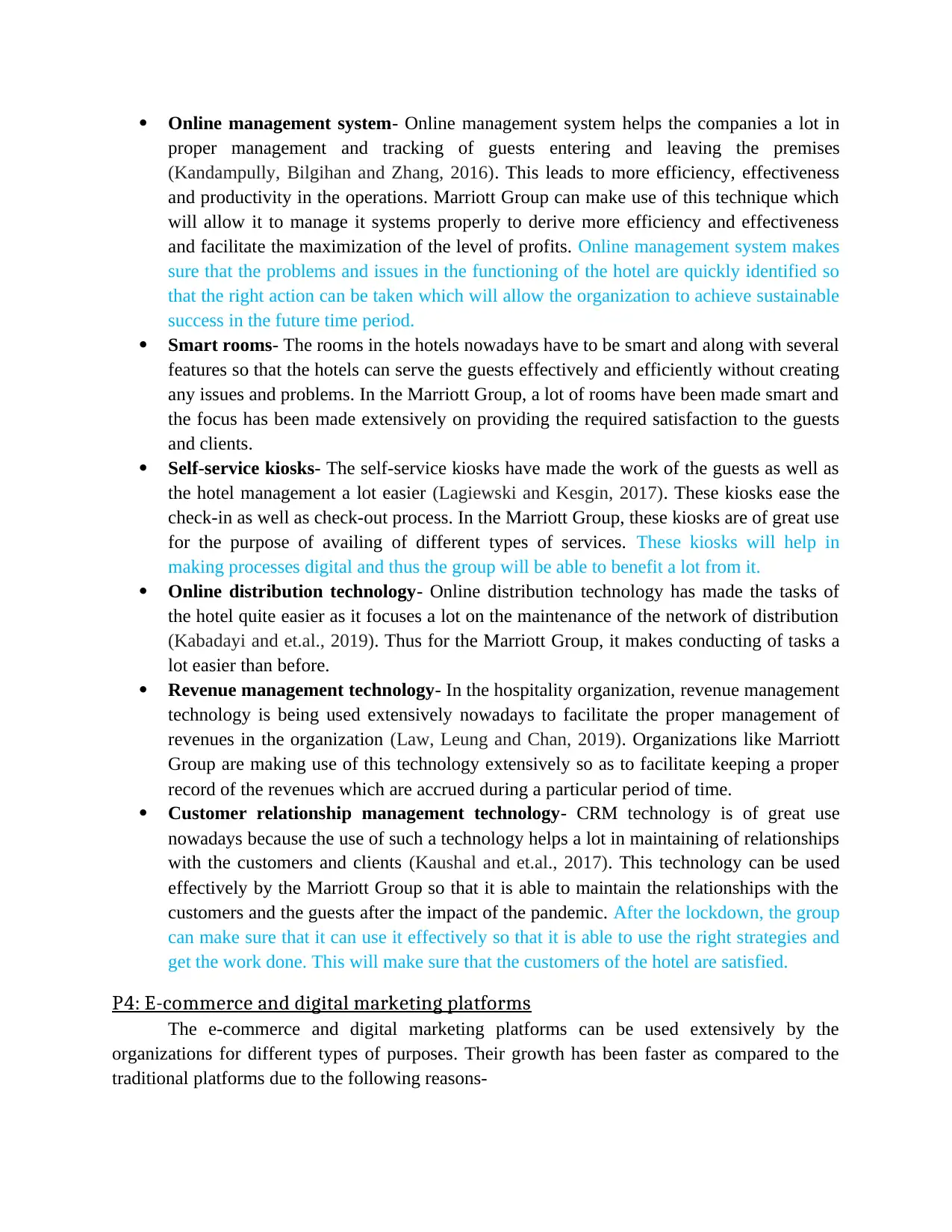
proper management and tracking of guests entering and leaving the premises
(Kandampully, Bilgihan and Zhang, 2016). This leads to more efficiency, effectiveness
and productivity in the operations. Marriott Group can make use of this technique which
will allow it to manage it systems properly to derive more efficiency and effectiveness
and facilitate the maximization of the level of profits. Online management system makes
sure that the problems and issues in the functioning of the hotel are quickly identified so
that the right action can be taken which will allow the organization to achieve sustainable
success in the future time period.
Smart rooms- The rooms in the hotels nowadays have to be smart and along with several
features so that the hotels can serve the guests effectively and efficiently without creating
any issues and problems. In the Marriott Group, a lot of rooms have been made smart and
the focus has been made extensively on providing the required satisfaction to the guests
and clients.
Self-service kiosks- The self-service kiosks have made the work of the guests as well as
the hotel management a lot easier (Lagiewski and Kesgin, 2017). These kiosks ease the
check-in as well as check-out process. In the Marriott Group, these kiosks are of great use
for the purpose of availing of different types of services. These kiosks will help in
making processes digital and thus the group will be able to benefit a lot from it.
Online distribution technology- Online distribution technology has made the tasks of
the hotel quite easier as it focuses a lot on the maintenance of the network of distribution
(Kabadayi and et.al., 2019). Thus for the Marriott Group, it makes conducting of tasks a
lot easier than before.
Revenue management technology- In the hospitality organization, revenue management
technology is being used extensively nowadays to facilitate the proper management of
revenues in the organization (Law, Leung and Chan, 2019). Organizations like Marriott
Group are making use of this technology extensively so as to facilitate keeping a proper
record of the revenues which are accrued during a particular period of time.
Customer relationship management technology- CRM technology is of great use
nowadays because the use of such a technology helps a lot in maintaining of relationships
with the customers and clients (Kaushal and et.al., 2017). This technology can be used
effectively by the Marriott Group so that it is able to maintain the relationships with the
customers and the guests after the impact of the pandemic. After the lockdown, the group
can make sure that it can use it effectively so that it is able to use the right strategies and
get the work done. This will make sure that the customers of the hotel are satisfied.
P4: E-commerce and digital marketing platforms
The e-commerce and digital marketing platforms can be used extensively by the
organizations for different types of purposes. Their growth has been faster as compared to the
traditional platforms due to the following reasons-
⊘ This is a preview!⊘
Do you want full access?
Subscribe today to unlock all pages.

Trusted by 1+ million students worldwide
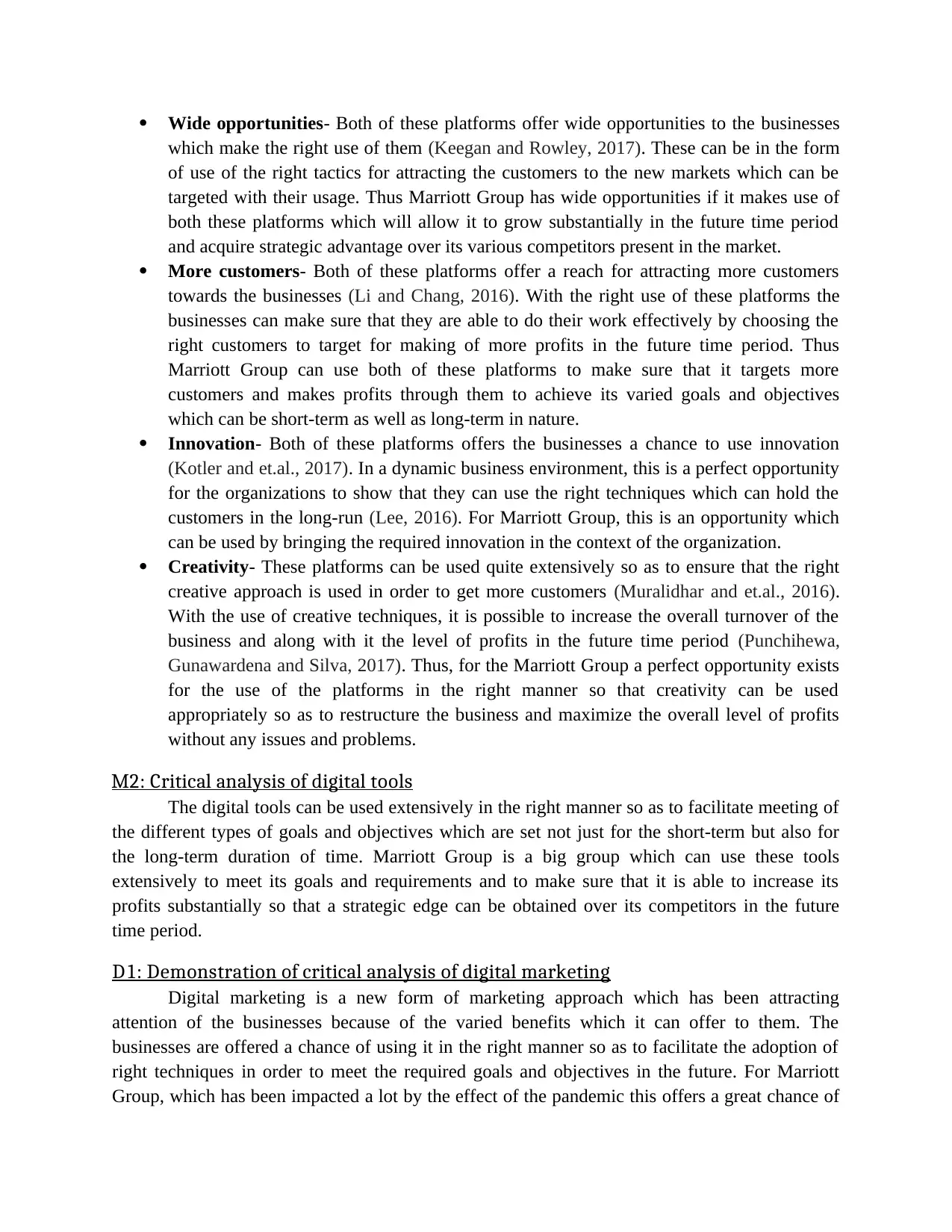
which make the right use of them (Keegan and Rowley, 2017). These can be in the form
of use of the right tactics for attracting the customers to the new markets which can be
targeted with their usage. Thus Marriott Group has wide opportunities if it makes use of
both these platforms which will allow it to grow substantially in the future time period
and acquire strategic advantage over its various competitors present in the market.
More customers- Both of these platforms offer a reach for attracting more customers
towards the businesses (Li and Chang, 2016). With the right use of these platforms the
businesses can make sure that they are able to do their work effectively by choosing the
right customers to target for making of more profits in the future time period. Thus
Marriott Group can use both of these platforms to make sure that it targets more
customers and makes profits through them to achieve its varied goals and objectives
which can be short-term as well as long-term in nature.
Innovation- Both of these platforms offers the businesses a chance to use innovation
(Kotler and et.al., 2017). In a dynamic business environment, this is a perfect opportunity
for the organizations to show that they can use the right techniques which can hold the
customers in the long-run (Lee, 2016). For Marriott Group, this is an opportunity which
can be used by bringing the required innovation in the context of the organization.
Creativity- These platforms can be used quite extensively so as to ensure that the right
creative approach is used in order to get more customers (Muralidhar and et.al., 2016).
With the use of creative techniques, it is possible to increase the overall turnover of the
business and along with it the level of profits in the future time period (Punchihewa,
Gunawardena and Silva, 2017). Thus, for the Marriott Group a perfect opportunity exists
for the use of the platforms in the right manner so that creativity can be used
appropriately so as to restructure the business and maximize the overall level of profits
without any issues and problems.
M2: Critical analysis of digital tools
The digital tools can be used extensively in the right manner so as to facilitate meeting of
the different types of goals and objectives which are set not just for the short-term but also for
the long-term duration of time. Marriott Group is a big group which can use these tools
extensively to meet its goals and requirements and to make sure that it is able to increase its
profits substantially so that a strategic edge can be obtained over its competitors in the future
time period.
D1: Demonstration of critical analysis of digital marketing
Digital marketing is a new form of marketing approach which has been attracting
attention of the businesses because of the varied benefits which it can offer to them. The
businesses are offered a chance of using it in the right manner so as to facilitate the adoption of
right techniques in order to meet the required goals and objectives in the future. For Marriott
Group, which has been impacted a lot by the effect of the pandemic this offers a great chance of
Paraphrase This Document
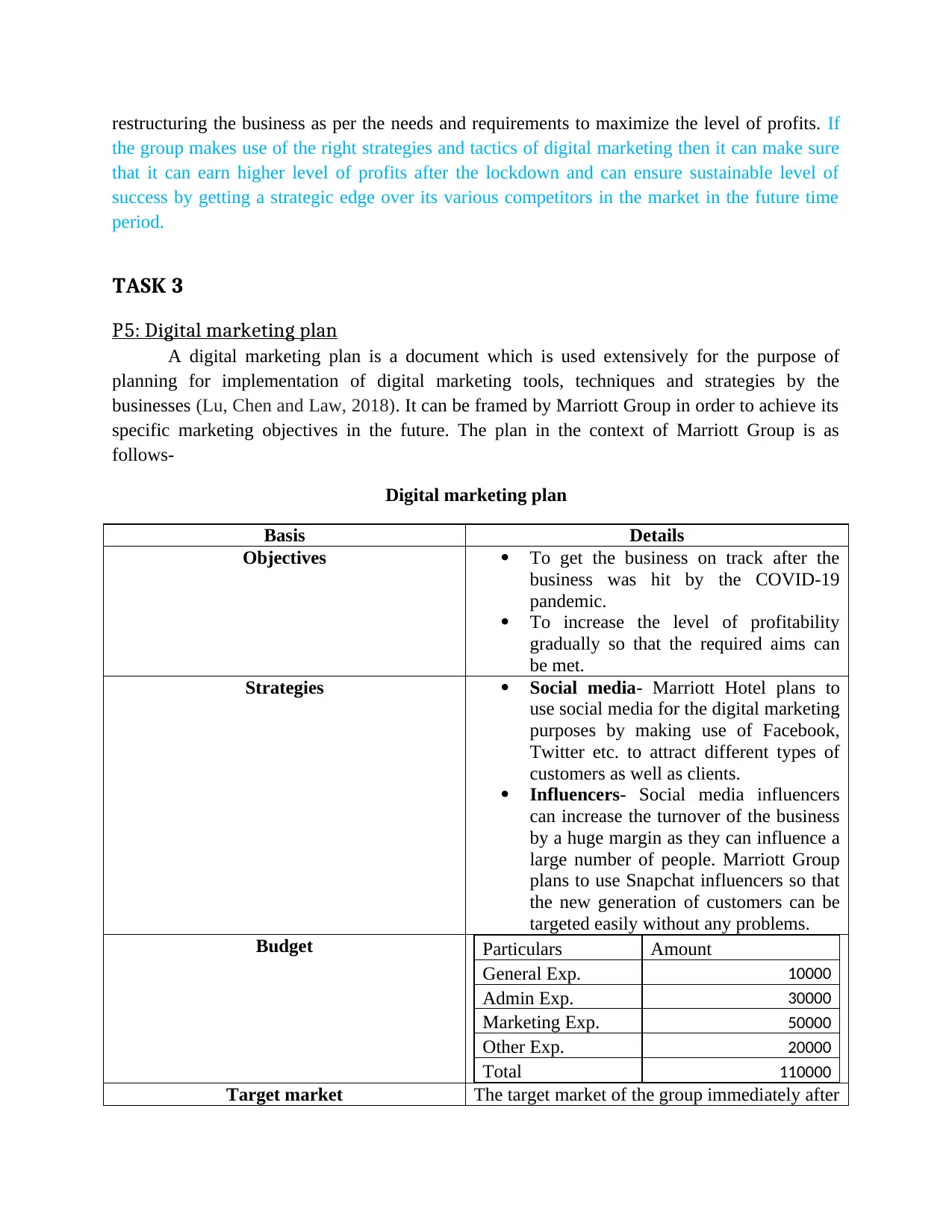
the group makes use of the right strategies and tactics of digital marketing then it can make sure
that it can earn higher level of profits after the lockdown and can ensure sustainable level of
success by getting a strategic edge over its various competitors in the market in the future time
period.
TASK 3
P5: Digital marketing plan
A digital marketing plan is a document which is used extensively for the purpose of
planning for implementation of digital marketing tools, techniques and strategies by the
businesses (Lu, Chen and Law, 2018). It can be framed by Marriott Group in order to achieve its
specific marketing objectives in the future. The plan in the context of Marriott Group is as
follows-
Digital marketing plan
Basis Details
Objectives To get the business on track after the
business was hit by the COVID-19
pandemic.
To increase the level of profitability
gradually so that the required aims can
be met.
Strategies Social media- Marriott Hotel plans to
use social media for the digital marketing
purposes by making use of Facebook,
Twitter etc. to attract different types of
customers as well as clients.
Influencers- Social media influencers
can increase the turnover of the business
by a huge margin as they can influence a
large number of people. Marriott Group
plans to use Snapchat influencers so that
the new generation of customers can be
targeted easily without any problems.
Budget Particulars Amount
General Exp. 10000
Admin Exp. 30000
Marketing Exp. 50000
Other Exp. 20000
Total 110000
Target market The target market of the group immediately after
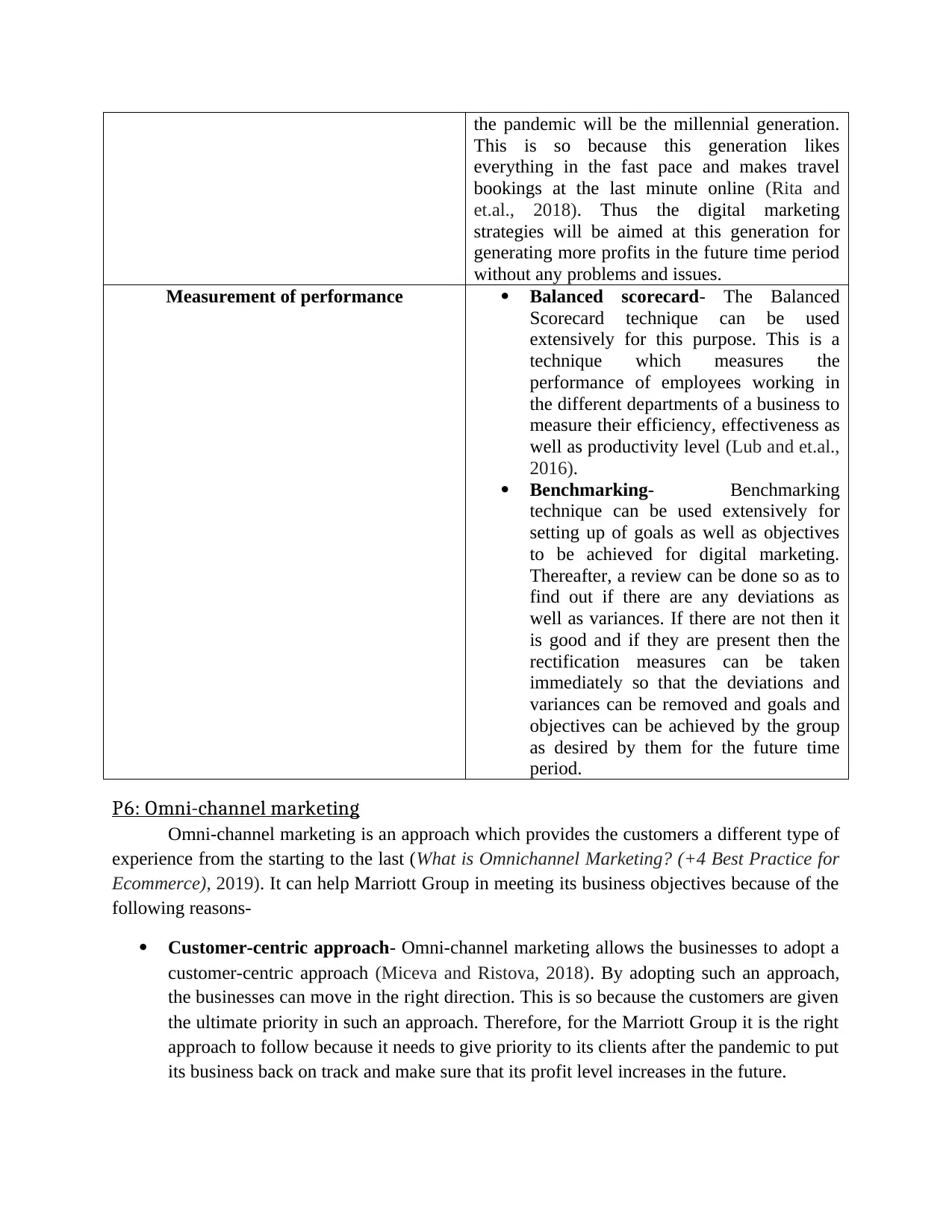
This is so because this generation likes
everything in the fast pace and makes travel
bookings at the last minute online (Rita and
et.al., 2018). Thus the digital marketing
strategies will be aimed at this generation for
generating more profits in the future time period
without any problems and issues.
Measurement of performance Balanced scorecard- The Balanced
Scorecard technique can be used
extensively for this purpose. This is a
technique which measures the
performance of employees working in
the different departments of a business to
measure their efficiency, effectiveness as
well as productivity level (Lub and et.al.,
2016).
Benchmarking- Benchmarking
technique can be used extensively for
setting up of goals as well as objectives
to be achieved for digital marketing.
Thereafter, a review can be done so as to
find out if there are any deviations as
well as variances. If there are not then it
is good and if they are present then the
rectification measures can be taken
immediately so that the deviations and
variances can be removed and goals and
objectives can be achieved by the group
as desired by them for the future time
period.
P6: Omni-channel marketing
Omni-channel marketing is an approach which provides the customers a different type of
experience from the starting to the last (What is Omnichannel Marketing? (+4 Best Practice for
Ecommerce), 2019). It can help Marriott Group in meeting its business objectives because of the
following reasons-
Customer-centric approach- Omni-channel marketing allows the businesses to adopt a
customer-centric approach (Miceva and Ristova, 2018). By adopting such an approach,
the businesses can move in the right direction. This is so because the customers are given
the ultimate priority in such an approach. Therefore, for the Marriott Group it is the right
approach to follow because it needs to give priority to its clients after the pandemic to put
its business back on track and make sure that its profit level increases in the future.
⊘ This is a preview!⊘
Do you want full access?
Subscribe today to unlock all pages.

Trusted by 1+ million students worldwide
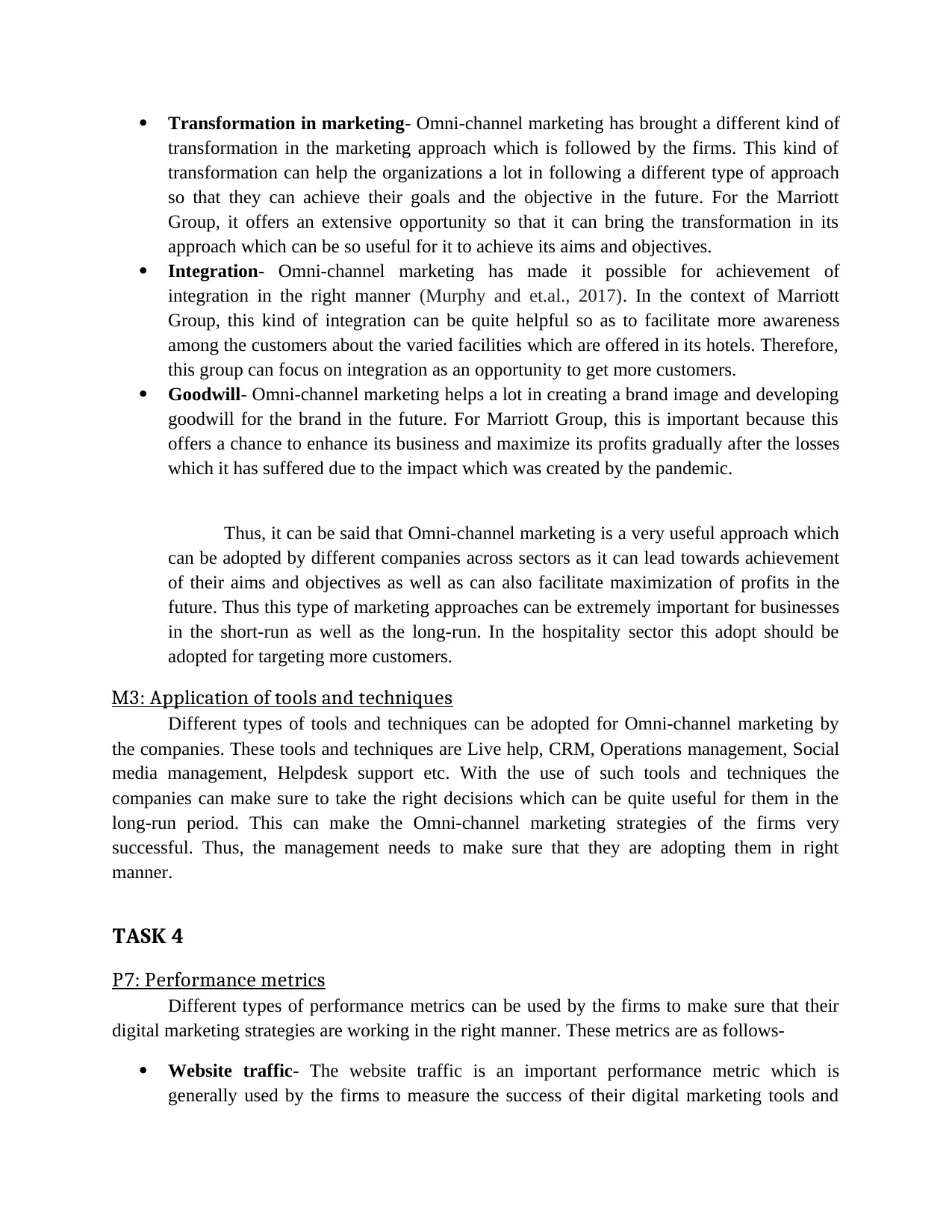
transformation in the marketing approach which is followed by the firms. This kind of
transformation can help the organizations a lot in following a different type of approach
so that they can achieve their goals and the objective in the future. For the Marriott
Group, it offers an extensive opportunity so that it can bring the transformation in its
approach which can be so useful for it to achieve its aims and objectives.
Integration- Omni-channel marketing has made it possible for achievement of
integration in the right manner (Murphy and et.al., 2017). In the context of Marriott
Group, this kind of integration can be quite helpful so as to facilitate more awareness
among the customers about the varied facilities which are offered in its hotels. Therefore,
this group can focus on integration as an opportunity to get more customers.
Goodwill- Omni-channel marketing helps a lot in creating a brand image and developing
goodwill for the brand in the future. For Marriott Group, this is important because this
offers a chance to enhance its business and maximize its profits gradually after the losses
which it has suffered due to the impact which was created by the pandemic.
Thus, it can be said that Omni-channel marketing is a very useful approach which
can be adopted by different companies across sectors as it can lead towards achievement
of their aims and objectives as well as can also facilitate maximization of profits in the
future. Thus this type of marketing approaches can be extremely important for businesses
in the short-run as well as the long-run. In the hospitality sector this adopt should be
adopted for targeting more customers.
M3: Application of tools and techniques
Different types of tools and techniques can be adopted for Omni-channel marketing by
the companies. These tools and techniques are Live help, CRM, Operations management, Social
media management, Helpdesk support etc. With the use of such tools and techniques the
companies can make sure to take the right decisions which can be quite useful for them in the
long-run period. This can make the Omni-channel marketing strategies of the firms very
successful. Thus, the management needs to make sure that they are adopting them in right
manner.
TASK 4
P7: Performance metrics
Different types of performance metrics can be used by the firms to make sure that their
digital marketing strategies are working in the right manner. These metrics are as follows-
Website traffic- The website traffic is an important performance metric which is
generally used by the firms to measure the success of their digital marketing tools and
Paraphrase This Document
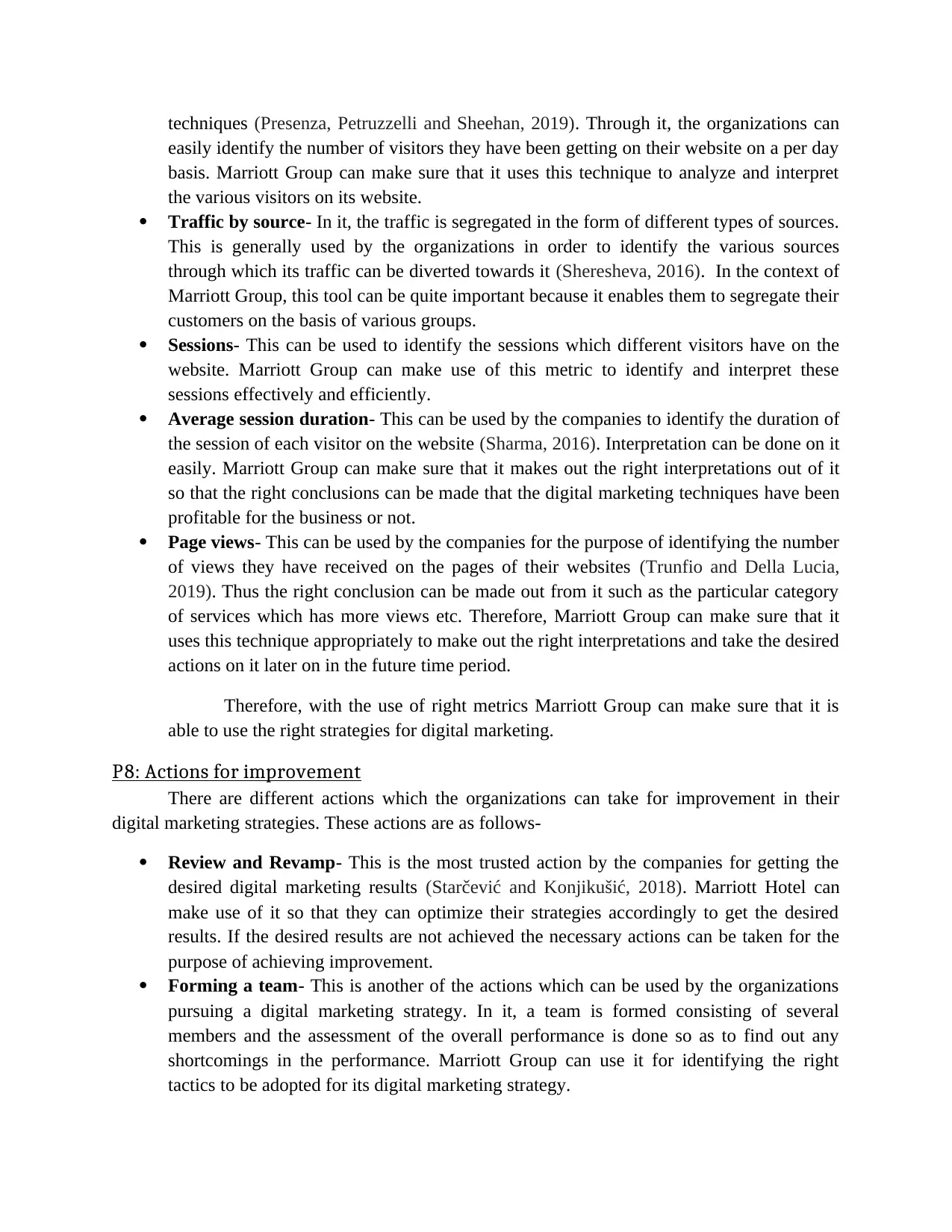
easily identify the number of visitors they have been getting on their website on a per day
basis. Marriott Group can make sure that it uses this technique to analyze and interpret
the various visitors on its website.
Traffic by source- In it, the traffic is segregated in the form of different types of sources.
This is generally used by the organizations in order to identify the various sources
through which its traffic can be diverted towards it (Sheresheva, 2016). In the context of
Marriott Group, this tool can be quite important because it enables them to segregate their
customers on the basis of various groups.
Sessions- This can be used to identify the sessions which different visitors have on the
website. Marriott Group can make use of this metric to identify and interpret these
sessions effectively and efficiently.
Average session duration- This can be used by the companies to identify the duration of
the session of each visitor on the website (Sharma, 2016). Interpretation can be done on it
easily. Marriott Group can make sure that it makes out the right interpretations out of it
so that the right conclusions can be made that the digital marketing techniques have been
profitable for the business or not.
Page views- This can be used by the companies for the purpose of identifying the number
of views they have received on the pages of their websites (Trunfio and Della Lucia,
2019). Thus the right conclusion can be made out from it such as the particular category
of services which has more views etc. Therefore, Marriott Group can make sure that it
uses this technique appropriately to make out the right interpretations and take the desired
actions on it later on in the future time period.
Therefore, with the use of right metrics Marriott Group can make sure that it is
able to use the right strategies for digital marketing.
P8: Actions for improvement
There are different actions which the organizations can take for improvement in their
digital marketing strategies. These actions are as follows-
Review and Revamp- This is the most trusted action by the companies for getting the
desired digital marketing results (Starčević and Konjikušić, 2018). Marriott Hotel can
make use of it so that they can optimize their strategies accordingly to get the desired
results. If the desired results are not achieved the necessary actions can be taken for the
purpose of achieving improvement.
Forming a team- This is another of the actions which can be used by the organizations
pursuing a digital marketing strategy. In it, a team is formed consisting of several
members and the assessment of the overall performance is done so as to find out any
shortcomings in the performance. Marriott Group can use it for identifying the right
tactics to be adopted for its digital marketing strategy.
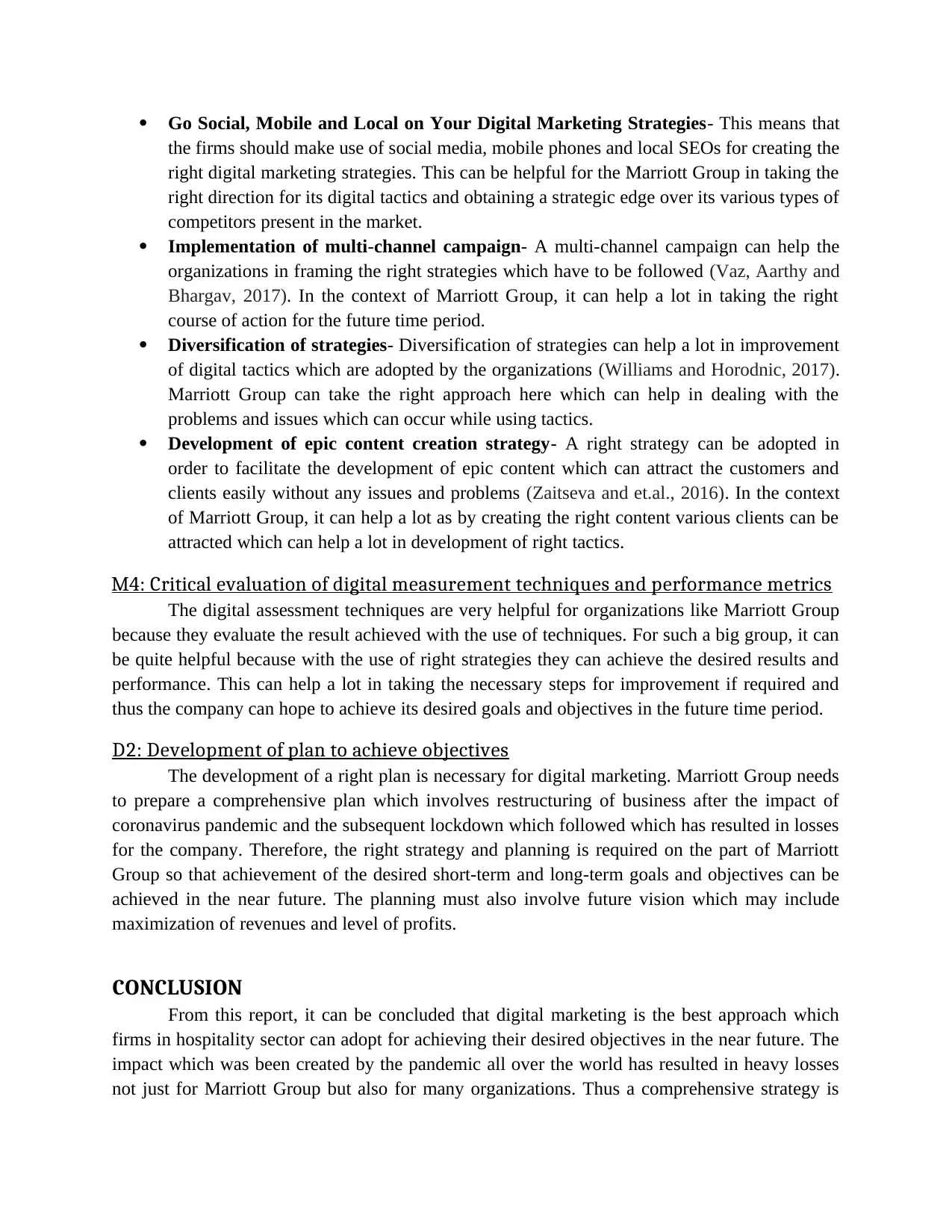
the firms should make use of social media, mobile phones and local SEOs for creating the
right digital marketing strategies. This can be helpful for the Marriott Group in taking the
right direction for its digital tactics and obtaining a strategic edge over its various types of
competitors present in the market.
Implementation of multi-channel campaign- A multi-channel campaign can help the
organizations in framing the right strategies which have to be followed (Vaz, Aarthy and
Bhargav, 2017). In the context of Marriott Group, it can help a lot in taking the right
course of action for the future time period.
Diversification of strategies- Diversification of strategies can help a lot in improvement
of digital tactics which are adopted by the organizations (Williams and Horodnic, 2017).
Marriott Group can take the right approach here which can help in dealing with the
problems and issues which can occur while using tactics.
Development of epic content creation strategy- A right strategy can be adopted in
order to facilitate the development of epic content which can attract the customers and
clients easily without any issues and problems (Zaitseva and et.al., 2016). In the context
of Marriott Group, it can help a lot as by creating the right content various clients can be
attracted which can help a lot in development of right tactics.
M4: Critical evaluation of digital measurement techniques and performance metrics
The digital assessment techniques are very helpful for organizations like Marriott Group
because they evaluate the result achieved with the use of techniques. For such a big group, it can
be quite helpful because with the use of right strategies they can achieve the desired results and
performance. This can help a lot in taking the necessary steps for improvement if required and
thus the company can hope to achieve its desired goals and objectives in the future time period.
D2: Development of plan to achieve objectives
The development of a right plan is necessary for digital marketing. Marriott Group needs
to prepare a comprehensive plan which involves restructuring of business after the impact of
coronavirus pandemic and the subsequent lockdown which followed which has resulted in losses
for the company. Therefore, the right strategy and planning is required on the part of Marriott
Group so that achievement of the desired short-term and long-term goals and objectives can be
achieved in the near future. The planning must also involve future vision which may include
maximization of revenues and level of profits.
CONCLUSION
From this report, it can be concluded that digital marketing is the best approach which
firms in hospitality sector can adopt for achieving their desired objectives in the near future. The
impact which was been created by the pandemic all over the world has resulted in heavy losses
not just for Marriott Group but also for many organizations. Thus a comprehensive strategy is
⊘ This is a preview!⊘
Do you want full access?
Subscribe today to unlock all pages.

Trusted by 1+ million students worldwide
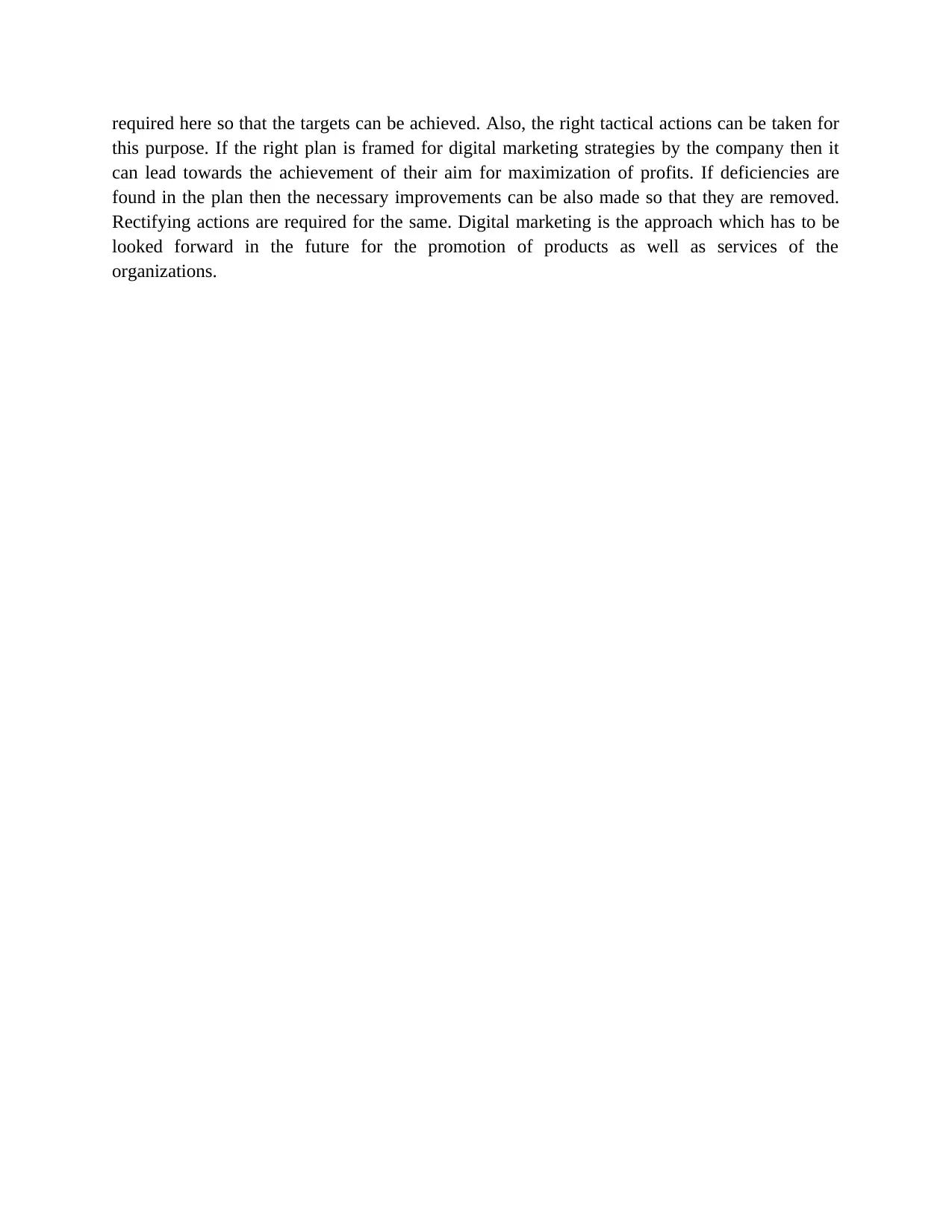
this purpose. If the right plan is framed for digital marketing strategies by the company then it
can lead towards the achievement of their aim for maximization of profits. If deficiencies are
found in the plan then the necessary improvements can be also made so that they are removed.
Rectifying actions are required for the same. Digital marketing is the approach which has to be
looked forward in the future for the promotion of products as well as services of the
organizations.
Paraphrase This Document
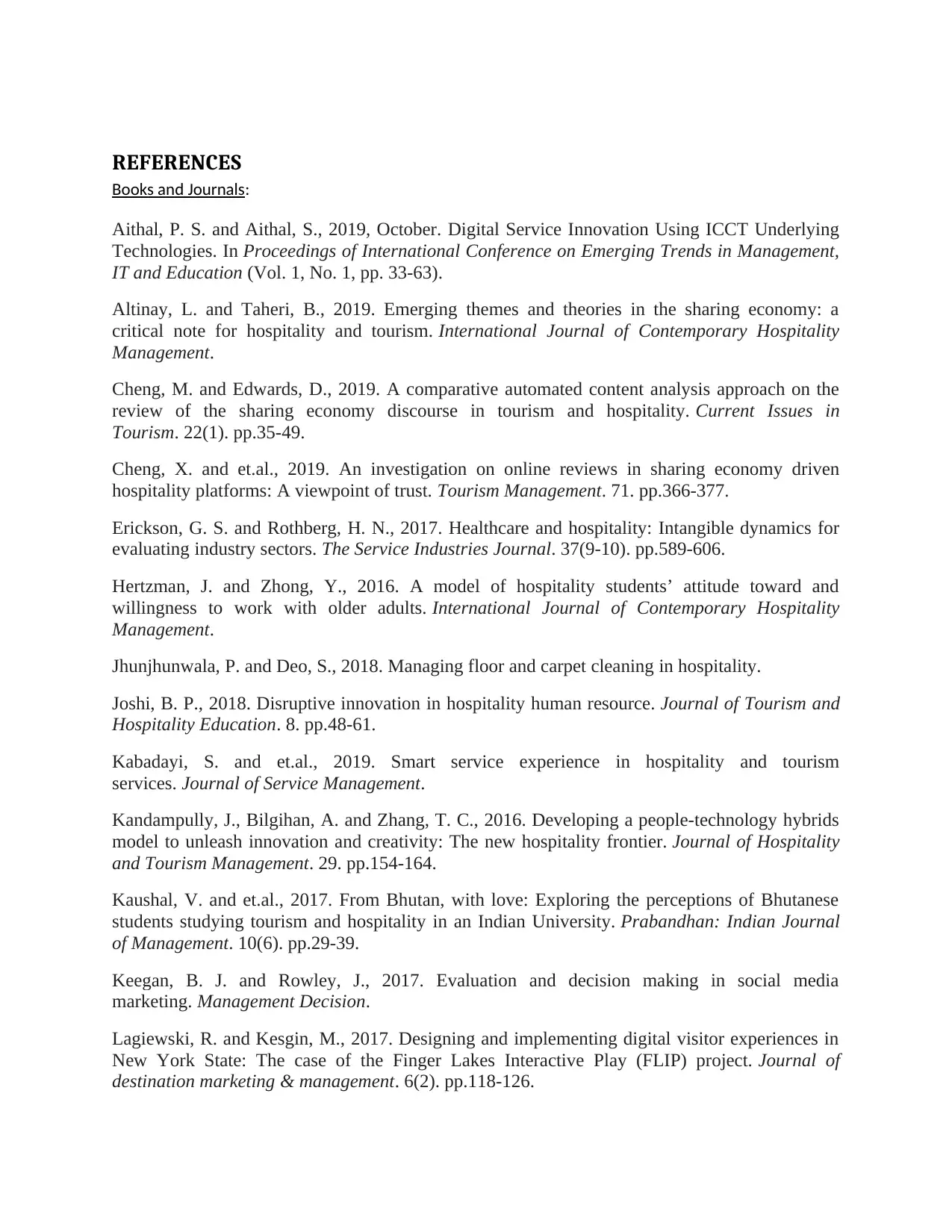
Books and Journals:
Aithal, P. S. and Aithal, S., 2019, October. Digital Service Innovation Using ICCT Underlying
Technologies. In Proceedings of International Conference on Emerging Trends in Management,
IT and Education (Vol. 1, No. 1, pp. 33-63).
Altinay, L. and Taheri, B., 2019. Emerging themes and theories in the sharing economy: a
critical note for hospitality and tourism. International Journal of Contemporary Hospitality
Management.
Cheng, M. and Edwards, D., 2019. A comparative automated content analysis approach on the
review of the sharing economy discourse in tourism and hospitality. Current Issues in
Tourism. 22(1). pp.35-49.
Cheng, X. and et.al., 2019. An investigation on online reviews in sharing economy driven
hospitality platforms: A viewpoint of trust. Tourism Management. 71. pp.366-377.
Erickson, G. S. and Rothberg, H. N., 2017. Healthcare and hospitality: Intangible dynamics for
evaluating industry sectors. The Service Industries Journal. 37(9-10). pp.589-606.
Hertzman, J. and Zhong, Y., 2016. A model of hospitality students’ attitude toward and
willingness to work with older adults. International Journal of Contemporary Hospitality
Management.
Jhunjhunwala, P. and Deo, S., 2018. Managing floor and carpet cleaning in hospitality.
Joshi, B. P., 2018. Disruptive innovation in hospitality human resource. Journal of Tourism and
Hospitality Education. 8. pp.48-61.
Kabadayi, S. and et.al., 2019. Smart service experience in hospitality and tourism
services. Journal of Service Management.
Kandampully, J., Bilgihan, A. and Zhang, T. C., 2016. Developing a people-technology hybrids
model to unleash innovation and creativity: The new hospitality frontier. Journal of Hospitality
and Tourism Management. 29. pp.154-164.
Kaushal, V. and et.al., 2017. From Bhutan, with love: Exploring the perceptions of Bhutanese
students studying tourism and hospitality in an Indian University. Prabandhan: Indian Journal
of Management. 10(6). pp.29-39.
Keegan, B. J. and Rowley, J., 2017. Evaluation and decision making in social media
marketing. Management Decision.
Lagiewski, R. and Kesgin, M., 2017. Designing and implementing digital visitor experiences in
New York State: The case of the Finger Lakes Interactive Play (FLIP) project. Journal of
destination marketing & management. 6(2). pp.118-126.
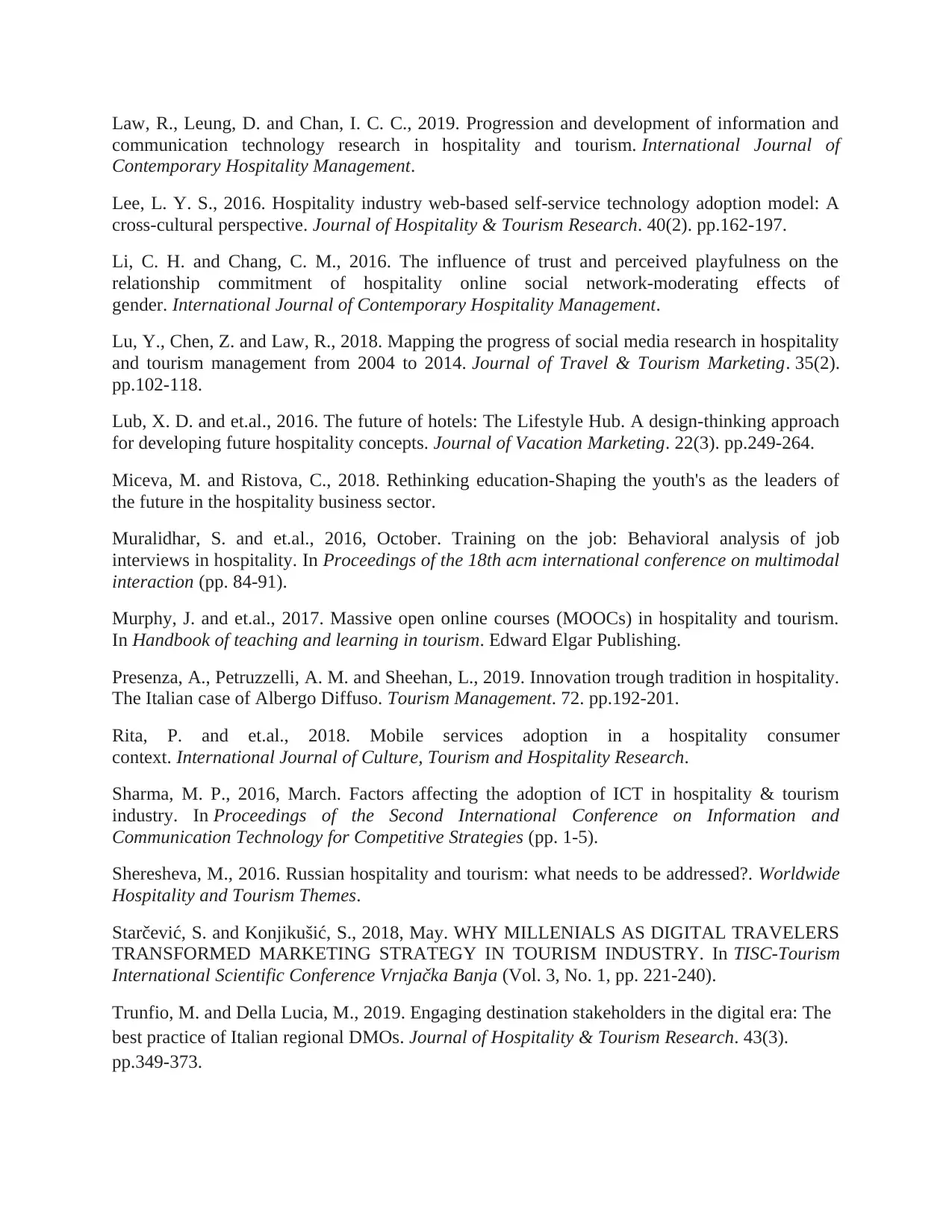
communication technology research in hospitality and tourism. International Journal of
Contemporary Hospitality Management.
Lee, L. Y. S., 2016. Hospitality industry web-based self-service technology adoption model: A
cross-cultural perspective. Journal of Hospitality & Tourism Research. 40(2). pp.162-197.
Li, C. H. and Chang, C. M., 2016. The influence of trust and perceived playfulness on the
relationship commitment of hospitality online social network-moderating effects of
gender. International Journal of Contemporary Hospitality Management.
Lu, Y., Chen, Z. and Law, R., 2018. Mapping the progress of social media research in hospitality
and tourism management from 2004 to 2014. Journal of Travel & Tourism Marketing. 35(2).
pp.102-118.
Lub, X. D. and et.al., 2016. The future of hotels: The Lifestyle Hub. A design-thinking approach
for developing future hospitality concepts. Journal of Vacation Marketing. 22(3). pp.249-264.
Miceva, M. and Ristova, C., 2018. Rethinking education-Shaping the youth's as the leaders of
the future in the hospitality business sector.
Muralidhar, S. and et.al., 2016, October. Training on the job: Behavioral analysis of job
interviews in hospitality. In Proceedings of the 18th acm international conference on multimodal
interaction (pp. 84-91).
Murphy, J. and et.al., 2017. Massive open online courses (MOOCs) in hospitality and tourism.
In Handbook of teaching and learning in tourism. Edward Elgar Publishing.
Presenza, A., Petruzzelli, A. M. and Sheehan, L., 2019. Innovation trough tradition in hospitality.
The Italian case of Albergo Diffuso. Tourism Management. 72. pp.192-201.
Rita, P. and et.al., 2018. Mobile services adoption in a hospitality consumer
context. International Journal of Culture, Tourism and Hospitality Research.
Sharma, M. P., 2016, March. Factors affecting the adoption of ICT in hospitality & tourism
industry. In Proceedings of the Second International Conference on Information and
Communication Technology for Competitive Strategies (pp. 1-5).
Sheresheva, M., 2016. Russian hospitality and tourism: what needs to be addressed?. Worldwide
Hospitality and Tourism Themes.
Starčević, S. and Konjikušić, S., 2018, May. WHY MILLENIALS AS DIGITAL TRAVELERS
TRANSFORMED MARKETING STRATEGY IN TOURISM INDUSTRY. In TISC-Tourism
International Scientific Conference Vrnjačka Banja (Vol. 3, No. 1, pp. 221-240).
Trunfio, M. and Della Lucia, M., 2019. Engaging destination stakeholders in the digital era: The
best practice of Italian regional DMOs. Journal of Hospitality & Tourism Research. 43(3).
pp.349-373.
⊘ This is a preview!⊘
Do you want full access?
Subscribe today to unlock all pages.

Trusted by 1+ million students worldwide
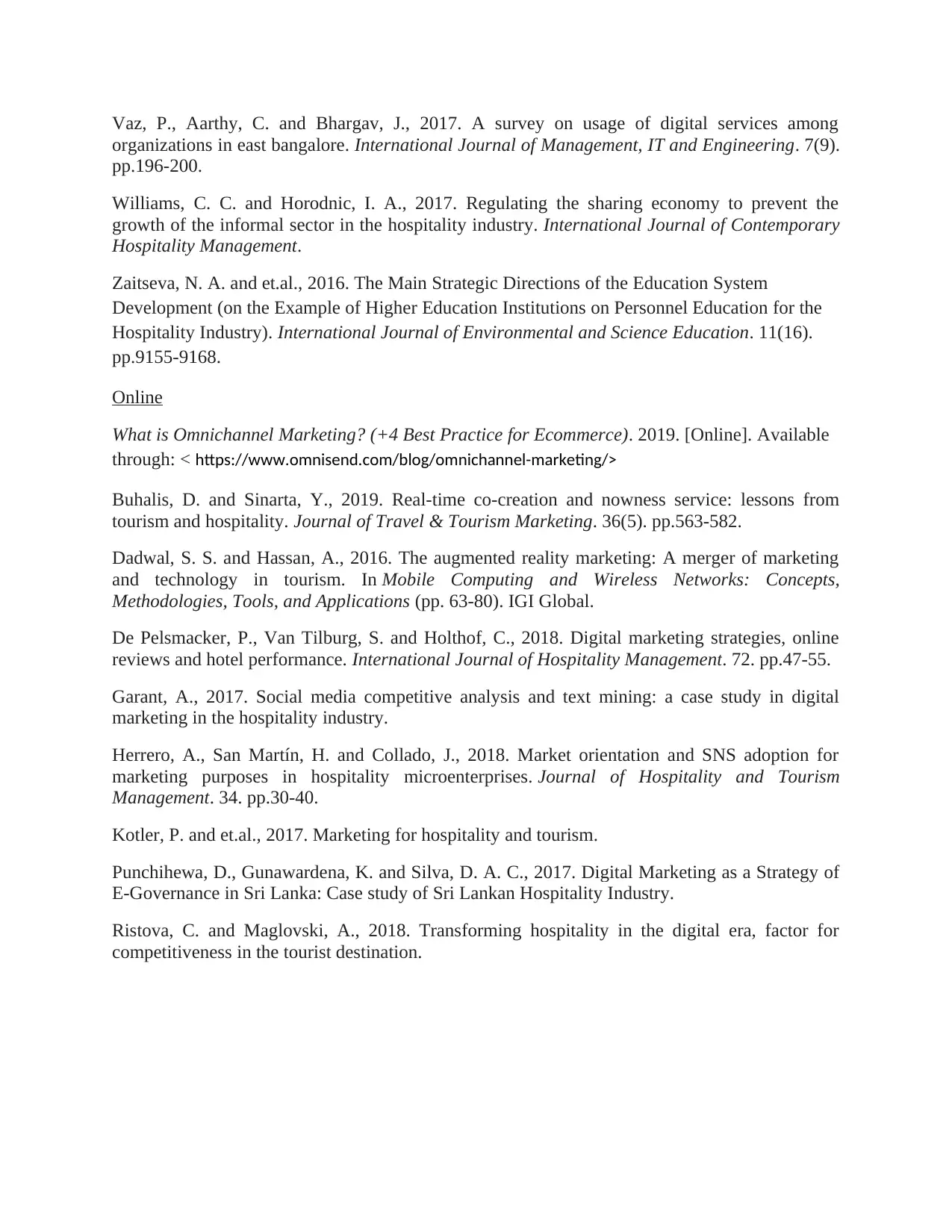
organizations in east bangalore. International Journal of Management, IT and Engineering. 7(9).
pp.196-200.
Williams, C. C. and Horodnic, I. A., 2017. Regulating the sharing economy to prevent the
growth of the informal sector in the hospitality industry. International Journal of Contemporary
Hospitality Management.
Zaitseva, N. A. and et.al., 2016. The Main Strategic Directions of the Education System
Development (on the Example of Higher Education Institutions on Personnel Education for the
Hospitality Industry). International Journal of Environmental and Science Education. 11(16).
pp.9155-9168.
Online
What is Omnichannel Marketing? (+4 Best Practice for Ecommerce). 2019. [Online]. Available
through: < https://www.omnisend.com/blog/omnichannel-marketing/>
Buhalis, D. and Sinarta, Y., 2019. Real-time co-creation and nowness service: lessons from
tourism and hospitality. Journal of Travel & Tourism Marketing. 36(5). pp.563-582.
Dadwal, S. S. and Hassan, A., 2016. The augmented reality marketing: A merger of marketing
and technology in tourism. In Mobile Computing and Wireless Networks: Concepts,
Methodologies, Tools, and Applications (pp. 63-80). IGI Global.
De Pelsmacker, P., Van Tilburg, S. and Holthof, C., 2018. Digital marketing strategies, online
reviews and hotel performance. International Journal of Hospitality Management. 72. pp.47-55.
Garant, A., 2017. Social media competitive analysis and text mining: a case study in digital
marketing in the hospitality industry.
Herrero, A., San Martín, H. and Collado, J., 2018. Market orientation and SNS adoption for
marketing purposes in hospitality microenterprises. Journal of Hospitality and Tourism
Management. 34. pp.30-40.
Kotler, P. and et.al., 2017. Marketing for hospitality and tourism.
Punchihewa, D., Gunawardena, K. and Silva, D. A. C., 2017. Digital Marketing as a Strategy of
E-Governance in Sri Lanka: Case study of Sri Lankan Hospitality Industry.
Ristova, C. and Maglovski, A., 2018. Transforming hospitality in the digital era, factor for
competitiveness in the tourist destination.
Paraphrase This Document


⊘ This is a preview!⊘
Do you want full access?
Subscribe today to unlock all pages.

Trusted by 1+ million students worldwide
Related Documents
Your All-in-One AI-Powered Toolkit for Academic Success.
+13062052269
info@desklib.com
Available 24*7 on WhatsApp / Email
![[object Object]](/_next/static/media/star-bottom.7253800d.svg)
© 2024 | Zucol Services PVT LTD | All rights reserved.





